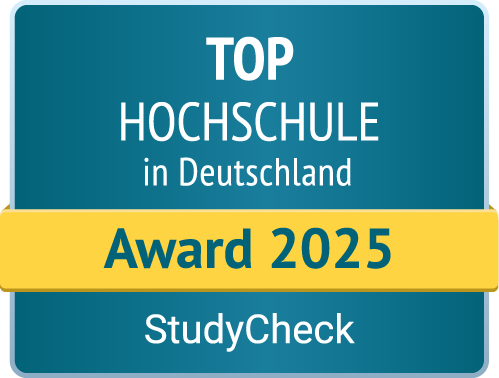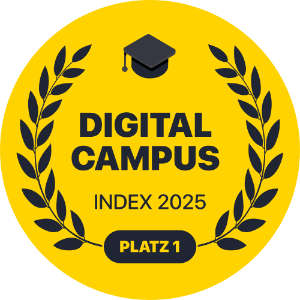Faculty of Media
Production Management Film and TV

Study overview
The Film and TV Production Management degree programme is a cooperative degree programme with in-depth practical training. It trains the production managers, production supervisors and recording managers who are indispensable for the production of any kind of moving image. According to the generally used differentiation, the term film production not only refers to the production of a cinema film, but also of television, online, advertising and image/industrial films, including further audiovisual content such as multi-platform, 360° or VR/AR films.
The degree programme is currently unique in the German-speaking world and is run in cooperation with the University of Television and Film Munich. The individual modules are tailored to the requirements of the film industry, so that the PMF degree programme is a suitable response to the film industry's great need for academically trained personnel in the field of production management.
| Short form | PMF |
| Type of stud | Vollzeit |
| Standard period of study | 7 Semester |
| Award | Bachelor of Arts (B.A.) |
| Start of studies | Wintersemester |
| Admission restrictions | spezifisch |
| Lecture location | Ansbach, München, online |
| Language of instruction | Deutsch |
| Course management | Prof. Dr. Christoph Menardi |
| Student advisory service | Prof. Renate Hermann |
| Student Services | studierendenservice.pmf(at)hs-ansbach.de |
Admission requirements
- General university entrance qualification
- Practical knowledge required
- Suitability assessment procedure if required
- Employment contract with a company in the film or TV industry in the area of production (in consultation with Ansbach University of Applied Sciences)
Our previous co-operation companies:
Additional requirements, which may be checked in an aptitude test:
- Basic understanding of production processes in terms of timing and duration.
- Basic access to creative-artistic thinking and acting
- Organisational and planning skills
- Basic understanding of financial aspects and interrelationships
- Ability to work in a team, conflict management and leadership skills
Study structure
The structure of the programme is based on the phases of a media production: assessment of scripts, material development, preparation for shooting/pre-production, shooting, post-production and marketing. The focus of the training is on the organisational and financial areas of production. Students receive a sound education in general production management, which enables them to work on media productions in a managerial capacity.
The great advantage is the close cooperation with the industry. The students are employed in production companies parallel to their studies and are thus in the midst of practice. This is just as true for the lecturers who, due to their proximity to the market, are able to impart concrete knowledge about current developments and provide the students with valuable background knowledge.
The study programme begins with an introduction to all sub-areas and concerns of a production, which are analysed from the first moment of idea generation to the start of marketing.
In the following semesters, this structure is deepened and explained in detail.
Occupational fields
The qualification of employees in the field of production management is an important factor for Germany as a production location. The qualifications acquired thus result in the following career opportunities for graduates:
- Production management (HL): The HL supervises and controls the production of a film work in the name of and on behalf of a production company (producer) during the preparation period, shooting and final production in organisational, technical, economic and financial respects.
- Production management (PL): The PL carries out audiovisual production projects (cinema film, TV, industrial, advertising, documentary and educational film) as a salaried employee with economic and organisational responsibility. He/she takes over the project financed and prepared by the HL and carries it out under the supervision of the HL and the producer.
- Production management (AL): The AL's field of activity includes the planning, organisation and execution of filming, taking into account temporal, local, dramaturgical and financial aspects. The AL is active in all areas of film production: Cinema and Television, Commercials, Industrial Film, Documentary, Show and Current Affairs.
- Post Production Supervisor (PPS): Similar to the PL during the shoot, the PPS takes care of the completion of the film after the shoot. This post-production process, which lasts several months, is planned, calculated and cost-monitored by the PPS (in consultation with the HL). This includes hiring team members (editors, sound editors, sound mixers, etc.), booking editing rooms and studios, coordinating dubbing work and acceptance tests.
FAQs on the Film and TV Production Management degree programme
General FAQs for prospective students can be found >>>here<<<
What is meant by "study with in-depth practice"?
This is understood as the combination of intensive practice in the company and study at a university. Students gain extensive practical experience parallel to their regular studies at the university by implementing the practical module components directly in the company, realising their own projects and also usually dealing with a practical problem of their own company in their Bachelor's thesis.
The company assignments are divided into practical phases during the current semester, the semester break, the practical semester and the time of the final thesis.
Under certain circumstances, additional practical work can be agreed upon individually between students and the practical company.
What are the admission requirements for PMF?
- Prospective students must have a higher education entrance qualification. You can find detailed information >>>here<<<
- In addition, a current employment contract / educational contract must be concluded with a practical company from the film industry.
- Proof of internships in a field related to the field of study must be submitted.
What costs does the practice company incur?
The practical company pays the students' remuneration including ancillary personnel costs. Whether further costs are incurred, e.g. for the provision of equipment to implement the practical module content, depends on the individual equipment of the company.
Can the location of the practice enterprise be at home and abroad?
The location of the practical company can in principle be in Germany or abroad. However, it must be ensured that the students can both complete the prescribed practical periods in the company and attend the classroom events in Ansbach and Munich.
How high is the proportion of time spent in practice in the company?
In PMF, practical module components are to be implemented in the company during the lecture period:
- in the 1st semester approx. 6 days,
- in the 2nd semester approx. 12 days,
- in the 3rd semester approx. 10 days,
- in the 4th semester approx. 5 days,
- in the 5th semester approx. 13 days,
- in the 6th semester the practical semester takes place,
- in the 7th semester approx. 3 days.
In general, students work full-time in their practical company during the semester break (1 August - 30 September; 15 February - 14 March). The practical semester is also completed in the company.
Additional weekly working hours can be agreed between the student and the company in the training contract. An annual hours account is also conceivable, so that more flexible planning can be made in consultation.
It is important that during the lecture period, the focus is on the studies and that the success of the studies is not jeopardised by additional working hours.
Where can I stay in Ansbach during the block lectures?
- Overnight accommodation at www.airbnb.de
- Website of the city of Ansbach
What are the rules on compulsory social security?
Students are subject to compulsory health, nursing care, pension and unemployment insurance for the entire duration of their studies with in-depth practice.
Detailed regulations on this can be found in the education contract.
Are dual students entitled to leave?
Yes. For studies with in-depth practice, the holiday entitlement is regulated in the education contract with the practice partner and is based on this.
Staff

Prof. Dr. Christoph Menardi
Studiengangsleiter Produktionsmanagement Film und TV (PMF)
0981 4877-368 50.4.5 nach Vereinbarung christoph.menardi vCard
Prof. Dr. Christoph Menardi

Studiengangsleiter Produktionsmanagement Film und TV (PMF)
Funktion
- Studiengangsleiter Produktionsmanagement Film und TV (PMF)
- Professor Produktionsmanagement Film und TV (PMF)

Prof. Renate Hermann, M.A.
Professorin Produktionsmanagement Film und TV (PMF) / Studienfachberatung Produktionsmanagement Film und TV (PMF)
0981 4877-234 Retti 022 (Rettistraße 56, 91522 Ansbach) nach Vereinbarung rhermann vCard
Prof. Renate Hermann, M.A.

Professorin Produktionsmanagement Film und TV (PMF) / Studienfachberatung Produktionsmanagement Film und TV (PMF)
Funktionen:
- Studiengangleitung Multimediale Information und Kommunikation (MIK)
- Vorsitzende Prüfungskommission Multimediale Information und Kommunikation (MIK)
- Studiengangsleitung Multimediale Medienproduktion (MMP)
- Professorin Multimedia und Kommunikation (MUK)
- Professorin Ressortjournalismus (RJO)
- Wissenschaftliche Leiterin Pixel Campus
Vita:
Nach dem Studium der Kommunikationswissenschaften, Biologie und Psychologie an der Ludwig-Maximilians-Universität München langjährige Erfahrung als Medizin-Journalistin (u. a. „Die Neue Ärztliche“/ FAZ, „International Medical News“) Filmautorin für Gesundheitsmagazine im BR und der ARD („Die Sprechstunde“, „Ratgeber Gesundheit“, „Report“, „alphamed“), Redakteurin „Bleib Gesund" (SAT 1), Dokuserie in Kooperation mit der Weltgesundheitsorganisation, WHO („Traditional Ways of Healing“), Stv. Chefredakteurin „Health Online Service“ (Burda / Bertelsmann) und Programmdirektion für medizinische Spartenkanäle (IP-TV)
Lehrt seit 1998 an der Hochschule Ansbach in den Bereichen Multimedia und Kommunikation sowie Telemedizin.
Schwerpunkte im Rahmen der Professur (seit 1.11.1999): Konzeption und Realisation von Printtiteln, Internetportalen und Multimedia-Projekten, Cross-Media-Marketing, Digitale Videoproduktionen für Industrie, staatliche bzw. kommunale Einrichtungen und Lehre, Weiterbildung von Akademikern (Zweitstudium und Ärztefortbildung)
Aufbau und Leitung des Studiengangs „Ressortjournalismus“ (Start Wintersemester 2008/09), Masterdozentin/DIZ, Mitglied der Programmkommission der Virtuellen Hochschule Bayern (vhb)
Ausgewählte Beispiele für realisierte und betreute Internetportale:
- Bayerisches Staatsministerium für Wissenschaft, Forschung und Kunst (www.stmwfk.bayern.de)
- Kulturportal Bayern (www.kulturportal-bayern.de)
- Bayerischer Bauernverband (www.bayerischerbauernverband.de)
- Landkreis Ansbach (www.landkreis-ansbach.de)
- Jugendportal Bayern (www.jupo.bayern.de)
- Studieren in Bayern (www.studieren-in-bayern.de)
Videopodcasts (z.B. für):
- Bayerisches Staatskanzlei / Ministerpräsident (www.bayern.de)
- Bayerisches Staatsministerium für Wissenschaft, Forschung und Kunst (www.stmwfk.bayern.de/Videos)
- Bayerisches Staatsministerium für Umwelt- und Gesundheit (www.mediathek.bayern.de)

Niklas Kronberger
Mitarbeiter Bereich Studierendenservice
Niklas Kronberger

Mitarbeiter Bereich Studierendenservice
Funktionen:
- Mitarbeiter Bereich Studierendenservice
Betreute Studiengänge:
- Produktionsmanagement Film und TV

Prof. Michael Leuthner
Professor für Multimedia und Kommunikation (MUK), Digital Learning (DL), Ressortjournalismus (RJO), Visualisierung und Interaktion in digitalen Medien (VIS)
0171 3849664 66.1.56 Dienstags 10:00–11:30 Uhr michael.leuthner vCard
Prof. Michael Leuthner

Professor für Multimedia und Kommunikation (MUK), Digital Learning (DL), Ressortjournalismus (RJO), Visualisierung und Interaktion in digitalen Medien (VIS)
Funktionen:
- Professor Multimedia und Kommunikation (MUK)
- Professor Digital Learning (DL)
- Professor Ressortjournalismus (RJO)
- Professor Visualisierung und Interaktion in digitalen Medien (VIS)
- Mitglied Fakultätsrat Medien
- Mitglied Senat und Hochschulrat
Lehrgebiete:
- Bewegtbild/Kamera

Ulrike Stroh
Fakultätsassistentin Medien
0981 4877-591 Retti 021 (Rettistraße 56, 91522 Ansbach) nach Vereinbarung ulrike.stroh vCard
Ulrike Stroh

Fakultätsassistentin Medien
Funktionen:
- Fakultätsassistentin Medien
Betreute Studiengänge:
- Produktionsmanagement Film und TV (PMF)
- Science Communication (SCO)
© 2025 Hochschule Ansbach

















